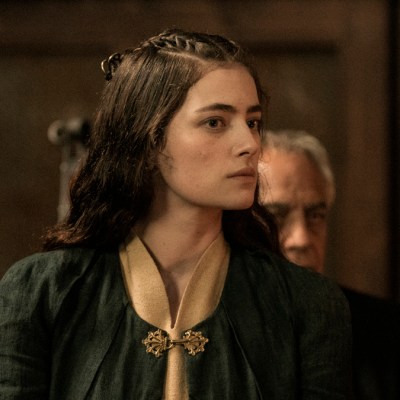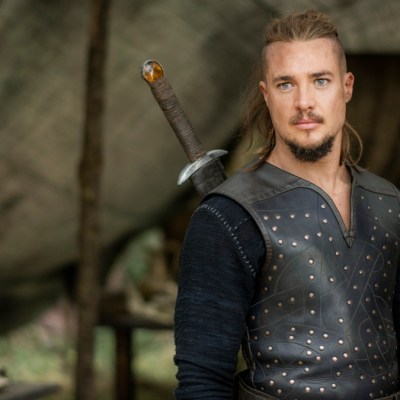The Last Kingdom’s Historical Advisor on Accuracy: ‘It’s a Constant Compromise’
After completing his PhD in Early Medieval History, Ryan Lavelle picked up a novel dramatising the events of King Alfred’s early reign. The Last Kingdom by Bernard Cornwell was the first in what was then known as the Saxon Stories saga. It told the story of Uhtred, a fictional 9th century Northumbrian warrior raised by Vikings who, despite a conflicted relationship with the king of Wessex, became Alfred’s military tactician. Lavelle lapped it up.
In the following years, Cornwell published another, and then another and another. Lavelle read them all, delighting in their inclusion of real historical events and use of a central character whose divided loyalties allowed a perspective into the very different worlds of Saxon and Dane.
“There were certain things in the novels, details that made me think ‘this isn’t quite right’, but I was impressed with Cornwell’s engagement with historical records and places,” he tells Den of Geek over Zoom, pointing out his editions of the Saxon Stories on the bookshelves behind him.
A decade after reading the first of the books, Lavelle was contacted by fellow historian Dame Janet ‘Jinty’ Nelson, to ask if he’d be interested in advising on a new historical TV drama. Filming was due to take place in Hungary, explained Professor Nelson, and she wasn’t keen to travel. The drama, she said, was an adaptation of a set of novels by “some chap called Cornwell”.
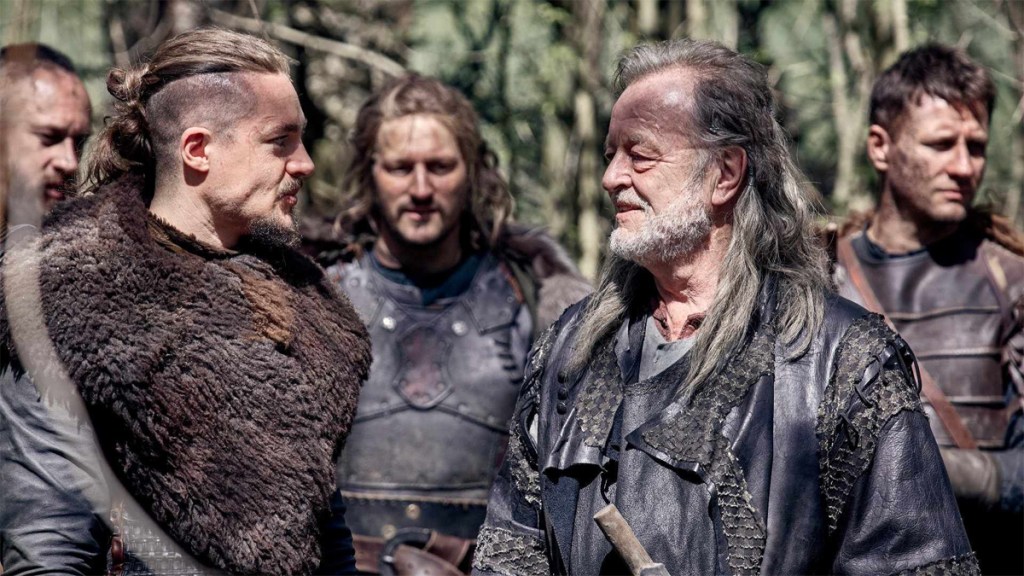
Lavelle laughs at the memory. “To me, Bernard Cornwell was a major figure in my consciousness! He wasn’t just ‘some chap called Cornwell’, this was the Bernard Cornwell. I was enormously excited. I still have an element of that initial excitement of thinking that this is a world that I’ve tried to inhabit in my mind, and it’s being paid enough attention to be able to put flesh on the bones of characters who’ve been dead for 1000 years.”
Six years later, and Lavelle has served as historical advisor across five seasons of The Last Kingdom, the hit Netflix drama that Cornwell’s book series has since been renamed for, which plans to start filming its fifth season in late 2020. On set, he’s felt the heat of a burning Viking hall and heard the battle cries and clashing swords of medieval warriors. Off set, he’s used the show as a talking point for undergraduates at the University of Winchester, looking at how its representation of events differs from historical evidence.
When that happens on The Last Kingdom, says Lavelle, it’s the choice of creators who are informed about the historical context but are choosing to serve the drama. “I have to be pedantic. I have to let them know when things aren’t right, but they have to make the decision, and they make those decisions from a perspective of being informed of the actual history.”
‘The historical clock moves faster than the clock in the drama’
Lavelle found his job relatively straightforward on The Last Kingdom’s first season. It retold the events of King Alfred’s reign from around 871 to the Battle of Edington (or Ethandun as it’s styled in the series) “reasonably closely, with a certain amount of licence.” That licence commonly involved condensing the timeline to cover more story over a shorter period. “In the first year of Alfred’s reign there were lots of different battles against the Vikings and in the series, that basically gets boiled down to two encounters.”
The most recent season took more liberties with the timeline. “Edward the Elder’s reign, on which the fourth season is based, was from 899-900 through to 924. Some of the things mentioned in season four actually happened quite late in Edward’s reign, so you’ve got the battle of Tettenhall, which took place in 910. Aethelred, the ealdorman of the Mercians, died in 911. Aethelflaed receiving the submission of the men of York didn’t happen until in 918… there’s a lot of things they’re having to change.”
There’s a very good reason for the drama to condense these events: the age of its cast. If the series stuck slavishly to the historical chronology, its characters would have had to have aged almost two decades over the course of the last eight episodes. According to a lay-person’s timeline like this one, that would leave lead character Uhtred (played by 37-year-old Alexander Dreymon) nearing his seventies by the finale, which clearly wouldn’t do.
“You’ll have noticed that Alex Dreymon’s still a good looking young man,” laughs Lavelle, “so we can’t push Uhtred’s age on too far! The historical clock moves on faster than the clock in the drama.”
For Lavelle, the most startling change to historical chronology in season four is the continued existence of King Alfred’s widow Aelswith, played by Eliza Butterworth. “Historically, she’s meant to be dead by 903! But she’s such a great character that I would have been very sad if she wasn’t there in season four. Aelswith, as a device, allows the family tensions to play out. If she wasn’t there, it would be difficult to get that to work.”
After being poisoned by the scheming Lord Aethelhelm in the season four finale, Aelswith was looking a bit peaky the last time we saw her, I point out. Lavelle laughs. “She’s not looking well at the end, no indeed! Maybe this is the historical clock catching up with her!”
‘You can’t have something as momentous as the Black Death and it not have a long-term affect’
Season four included a storyline that felt particularly timely when it arrived on Netflix in April 2020 mid-coronavirus pandemic. A deadly sickness was passing through the kingdoms, cutting a swathe through villages. The original idea from the writers was to portray it as “a full on bubonic plague,” says Lavelle, but that was dialled back for the series.
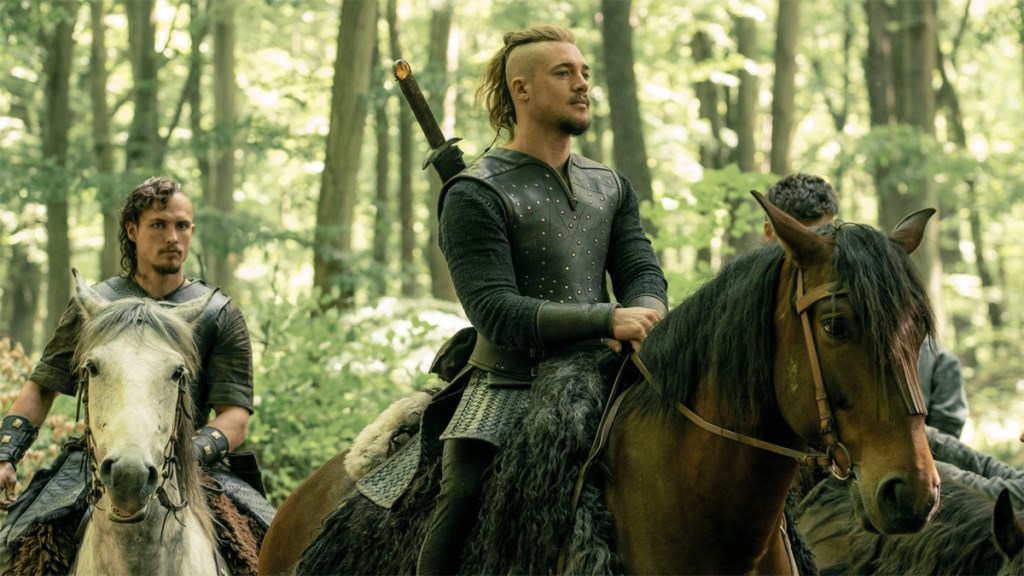
“Where the story eventually ended up, it was a small-scale epidemic in a confined area rather than being the Black Death, which would have totally changed the storyline. Bubonic plague happened much later, in the Late Middle Ages. You can’t have something as momentous as the Black Death and have it not affect life for the next fifty years, but the way the story was panning out, it only affected the drama over a short period. I hope I had some influence in this, because historically, that would have been a big change.”
Lavelle was able to reconcile himself to the sickness plot because there had been an outbreak of a plague in the period, just 10 years earlier, at the end of Alfred’s reign. “It was a case of history catching up with the storyline a little bit.”
‘We always have to play with history to some extent’
As an Early Medieval historian, Lavelle is accustomed to using his imagination to bridge gaps between what is and isn’t known from historical sources. “The evidence for our period is limited so we always have to play with history to some extent.” The Last Kingdom does the same, he says. It’s by no means a documentary, but demonstrates “a respectful acquaintance with the history of the period, a tip of the hat to historical events, you could say!”
Part of Lavelle’s advisory role involves making the Medieval character and place names accessible to a modern audience. He researches the names and spends a few hours practicing the pronunciations before making recordings that are interpreted by a dialogue coach and taught to the cast.
“People who are real experts in Old English would probably have me over a barrel in pronouncing them wrong, but it’s no use having the names beautifully pronounced in Old English or Old Norse if the viewers are constantly baffled by them. There are necessary compromises to get these names over the line and to allow viewers to talk about them too. There are constant discussions about what form the names should take.”
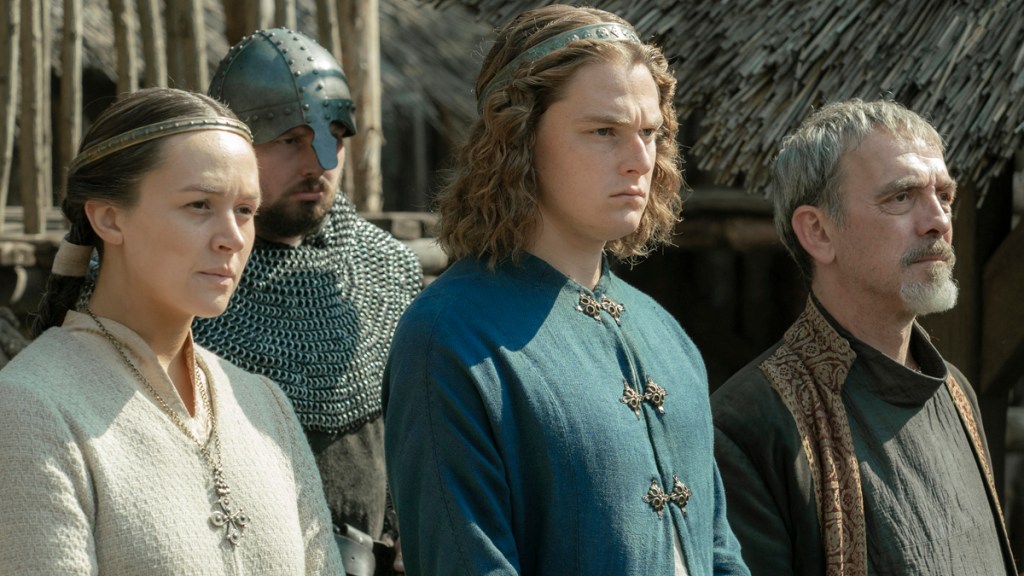
Lavelle admires the series’ place name captions, which appear in the original language before transitioning to the modern version. “Eoforwic is one of the most difficult, because there’s the old Norse name of ‘Jorvik’ which became the predominant place name form. What appears in historical documents is often a form of the name that’s been affected by its role in a sentence of historical record. In Old English there are particular forms of words according to what they’re doing in a sentence. What I’ve tried to do, in my imperfect Old English, is convert those to the nominative version of the place name in order that it reflects a version of the historical place name. We do think about these things,” he laughs, “they’re not just plucked off the back of an envelope!”
If he had his way, he laughs, the series would use the Old English letter ‘Thorn’, but it’s a matter of accessibility. “It’s a constant compromise. These things are… oh dear, I just fell into a pun,” he laughs, “a thorn in the side!”
Author Bernard Cornwell describes his books as a gateway into the study of real history, and Lavelle hopes the TV series is the same. On that note, outside of Cornwell’s novels, where might fans go looking for a hint of what’s to come in season five?
“It’ll be based on books nine and ten – The Warriors of the Storm and The Flame Bearer. Uhtred is charged with training King Edward’s first-born son Aethelstan as a warrior, so Aethelstan is one thing. Read a little bit more about Edward. If you do the homework of looking at the historical sources then it could allow the possibility of seeing some of the faces that might appear on screen! History has its own spoilers!”
Read more from Professor Lavelle on The Last Kingdom at History Extra.
The post The Last Kingdom’s Historical Advisor on Accuracy: ‘It’s a Constant Compromise’ appeared first on Den of Geek.
From https://www.denofgeek.com/tv/the-last-kingdoms-historical-advisor-on-accuracy-its-a-constant-compromise/

